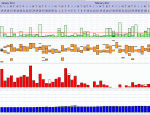Are We Really Carnivores?
Re: OT: Are We Really Carnivores?
I guess I may as well chime in here, agreeing with those who believe we are omnivores.
I was a vegan for 24 years. Started eating fish on advice from doctor because I developed high blood pressure at a relatively young age.
Before you know it, I decided to try a burger. That was the end of that vegan/vegetarian nonsense for me.
Proof right there that we didn't evolve from apes.
I was a vegan for 24 years. Started eating fish on advice from doctor because I developed high blood pressure at a relatively young age.
Before you know it, I decided to try a burger. That was the end of that vegan/vegetarian nonsense for me.
Proof right there that we didn't evolve from apes.
.
Vader
Vader
Re: Are We Really Carnivores?
I see humans as a kind of hybrid: being omnivorous enables us to survive; we can adapt to whatever we can obtain from our current habitat. But in terms of feeling good and thriving, each of us does best someplace on the continuum between strict vegetarian and heavily carnivorous.
To maintain the world's population on a diet with meat in it, we can...
1. Limit our population. It is possible for everyone to eat his/her individual optimal balance of vegetables, grains, fats, and animal proteins—and sustain the environment that supports our diets—if there are few enough of us.
2. Eat only what we need. If we want a world in which everyone gets proper nutrition (or even enough food at all), then those who can afford to eat more frequently and in larger portions have the responsibility to eat no more than what they need for proper nutrition.
3. Include pork, poultry, fish, eggs, and dairy products in our definition of "meat." These animals consume fewer resources and need less land than cows, and for me, anyway, give many of the same nutritional benefits. I eat animal protein three times a day, but beef at only about three-four meals per week. This is optimal for my particular body.
4. Eat grass-fed, organic, natural, free range when can afford it. This supports both our personal health and the environment from which our food comes.
Kind of like a family farm: a couple of cows, a few pigs, many chickens, a large vegetable garden, a field of grain, a stream out back for fishing—enough to feed each family member well, so they can do the work of this world.
I would love to live in this world!
To maintain the world's population on a diet with meat in it, we can...
1. Limit our population. It is possible for everyone to eat his/her individual optimal balance of vegetables, grains, fats, and animal proteins—and sustain the environment that supports our diets—if there are few enough of us.
2. Eat only what we need. If we want a world in which everyone gets proper nutrition (or even enough food at all), then those who can afford to eat more frequently and in larger portions have the responsibility to eat no more than what they need for proper nutrition.
3. Include pork, poultry, fish, eggs, and dairy products in our definition of "meat." These animals consume fewer resources and need less land than cows, and for me, anyway, give many of the same nutritional benefits. I eat animal protein three times a day, but beef at only about three-four meals per week. This is optimal for my particular body.
4. Eat grass-fed, organic, natural, free range when can afford it. This supports both our personal health and the environment from which our food comes.
Kind of like a family farm: a couple of cows, a few pigs, many chickens, a large vegetable garden, a field of grain, a stream out back for fishing—enough to feed each family member well, so they can do the work of this world.
I would love to live in this world!
Epworth Sleepiness Scale: 14
Diagnostic study: overall AHI: 0.2 events/hour; overall RDI: 45 events/hour
Titration study: AHI: 6.1; RDI: 27; CPAP pressures: 5-8cm
Not-tired behind my eyes and with a clear, cool head!
Diagnostic study: overall AHI: 0.2 events/hour; overall RDI: 45 events/hour
Titration study: AHI: 6.1; RDI: 27; CPAP pressures: 5-8cm
Not-tired behind my eyes and with a clear, cool head!
- Slartybartfast
- Posts: 1633
- Joined: Wed Sep 01, 2010 12:34 pm
Re: Are We Really Carnivores?
Perhaps the issue with our diet isn't so much strict carnivorous diet vs. strict vegetarian diet so much as it is the amount of simple sugars and starches that have become such a large part of our diet. We can munch on celery and carrots and string beans and broccoli all day and have no problem, but when we concentrate on high starch foods like potatoes, and flour, both of which we seem to consume in large quantities, that seems to cause problems with regards to blood sugar, diabetes and related diseases.
Re: Are We Really Carnivores?
Exactly so. I was about to go there, but wanted to remain true to the original topic. But since you opened that can of (sugar-free) worms...Slartybartfast wrote:Perhaps the issue with our diet isn't so much strict carnivorous diet vs. strict vegetarian diet so much as it is the amount of simple sugars and starches that have become such a large part of our diet (. . . . ) but when we concentrate on high starch foods like potatoes, and flour, both of which we seem to consume in large quantities, that seems to cause problems with regards to blood sugar, diabetes and related diseases.
I would love to live in a world in which we eliminate high-fructose corn syrup (it's in everything!), corn syrup, and all artificial sweeteners, and use only honey, molasses, fruits, agave, and even sugar, but sparingly. I know I am a much happier camper—and thinner—if I only eat/drink one simple carb every few days, and even then only accompanied by some kind of animal fat/protein to soften the blow. I wouldn't be at all surprised if excessive consumption of simple carbs were implicated in OSA as well.
Plus, we could sustain a few more grass-fed cows on our current corn fields supplying HFCS!
Epworth Sleepiness Scale: 14
Diagnostic study: overall AHI: 0.2 events/hour; overall RDI: 45 events/hour
Titration study: AHI: 6.1; RDI: 27; CPAP pressures: 5-8cm
Not-tired behind my eyes and with a clear, cool head!
Diagnostic study: overall AHI: 0.2 events/hour; overall RDI: 45 events/hour
Titration study: AHI: 6.1; RDI: 27; CPAP pressures: 5-8cm
Not-tired behind my eyes and with a clear, cool head!
Re: Are We Really Carnivores?
I think you got it right. I couldn't agree more.Slartybartfast wrote:Perhaps the issue with our diet isn't so much strict carnivorous diet vs. strict vegetarian diet so much as it is the amount of simple sugars and starches that have become such a large part of our diet. We can munch on celery and carrots and string beans and broccoli all day and have no problem, but when we concentrate on high starch foods like potatoes, and flour, both of which we seem to consume in large quantities, that seems to cause problems with regards to blood sugar, diabetes and related diseases.
.
Vader
Vader
Re: Are We Really Carnivores?
I've been using stevia for a few years now, and I really enjoy it.napstress wrote: I would love to live in a world in which we eliminate high-fructose corn syrup (it's in everything!), corn syrup, and all artificial sweeteners, and use only honey, molasses, fruits, agave, and even sugar, :::snip:::
It's recently also become available under the brand name "Truvia"
Zero calories, and it's natural, derived from stevia plant. IMO, it's way better than any other sweetener. Diabetic safe too.
.
Vader
Vader
Re: Are We Really Carnivores?
I think there is confusion over the definitions involved. There are biological definitions AND habitual definitions which differ from each other.
The biological definitions rely ONLY on the biological features which facilitate the capture, ingestion and digestion processes.
The habitual definitions consider what food groups are part of the regular diet.
Biological: hooves vs. claws; incisors/molars vs. fangs; relative length of intestines, etc.
Habitual: what is actually consumed; what is available in the native environment, etc.
Human biology suggests we are herbivores. Our habitual diets lean more toward omnivoristic.
The biological definitions rely ONLY on the biological features which facilitate the capture, ingestion and digestion processes.
The habitual definitions consider what food groups are part of the regular diet.
Biological: hooves vs. claws; incisors/molars vs. fangs; relative length of intestines, etc.
Habitual: what is actually consumed; what is available in the native environment, etc.
Human biology suggests we are herbivores. Our habitual diets lean more toward omnivoristic.
The OSA patient died quietly in his sleep.
Unlike his passengers who died screaming as the car went over the cliff...
Unlike his passengers who died screaming as the car went over the cliff...
- M.D.Hosehead
- Posts: 742
- Joined: Thu Jun 24, 2010 7:16 pm
- Location: Kansas
Re: Are We Really Carnivores?
napstress wrote:
To maintain the world's population on a diet with meat in it, we can...
Another possibility:
http://www.scientificamerican.com/artic ... e-meat-lab
_________________
| Mask: Forma Full Face CPAP Mask with Headgear |
| Additional Comments: MaxIPAP 15; MinEPAP 10; Also use Optilife nasal pillow mask with tape |
- Slartybartfast
- Posts: 1633
- Joined: Wed Sep 01, 2010 12:34 pm
Re: Are We Really Carnivores?
All the talk about the carrying capacity of the land and whether we SHOULD eat meat, etc., aside, and just talking biology/physiology here:LinkC wrote:Human biology suggests we are herbivores. Our habitual diets lean more toward omnivoristic.
But if we're herbivores, why can't we digest vegetables? Eat an ear of corn and look in the toilet the next day. Same with most vegetables. Eat a couple of handfulls of almonds and do likewise. We can extract the fats, starches and sugars and anything that's water or fat soluble from them, so long as they're thoroughly chewed, but the vast bulk passes right through undigested. Even seeds and nuts. Though we chew them as finely as we can, we can't digest most of what we eat. Our teeth aren't capable of grinding plant matter efficiently. We have to mill wheat and oats and barley into flour in order to provide enough surface area for our digestive enzymes to turn the starches into sugars, which can then be absorbed. And we simply cannot digest cellulose which forms the vast bulk of any vegetable. Only ruminants and critters like rabbits that have the disgusting habit of coprophagy (eating their own "rabbit raisins" allowing a second pass) can do that (never kiss a rabbit on the lips). And even then, their digestion is very inefficient, and those animals are constantly eating/grazing. They have to because most of what they eat passes through, undigested. Horses are famous for that. They're not ruminants, but they have huge stomachs and very long intestines. Man, like all carnivores, has a small stomach with highly acidic environment that's perfectly adapted for hydrolyzing proteins into their amino acid components, an efficient method of dealing with fats in the form of bile/gall bladder/liver, and short intestine that efficiently absorbs amino acids and fats (and sugars released during the digestion of starches), but not vegetable material, primarily cellulose . And we eat periodically, not constantly.
And just look at the differences in body form:
Herbivorous animals have huge abdominal cavities for their body size and are constantly eating/grazing/pooping. Elephants, hippos, rhinos, cattle, sheep, horses, rabbits.
Omnivores/opportunists that swing both ways, have relatively smaller abdominal cavities and spend less time eating than do strict herbivores. Bears, skunks, gorillas, chimps (the latter two are known to eat insects and grubs).
Carnivores have the smallest abdominal cavities and eat periodically. Lions, wolves, cats, ferrets.
So on that basis, where does Man fit in? Certainly not an herbivore. Not strictly a carnivore, I'll grant you. But probeably more tending toward the carnivore side of the omnivore classification.
- Lizistired
- Posts: 2835
- Joined: Tue Dec 14, 2010 10:47 pm
- Location: Indiana
Re: Are We Really Carnivores?
Slartybartfast, Here is a link to Richard K. Berstein's bio. It's a fascinating story, and what sold me. I think you can read the entire book online (The Diabetes Solution).
http://www.diabetes-book.com/book/mylife.shtml
Leads me to believe that unless I'm preparing for famine, insulin is poison.
http://www.diabetes-book.com/book/mylife.shtml
Leads me to believe that unless I'm preparing for famine, insulin is poison.
_________________
| Humidifier: S9™ Series H5i™ Heated Humidifier with Climate Control |
| Additional Comments: Swift FX sometimes, CMS-50F, Cervical collar sometimes, White noise, Zeo... I'm not well, but I'm better. |
ResScan: http://www.resmed.com/int/assets/html/s ... c=patients
ResScan Tutorial- http://montfordhouse.com/cpap/resscan_tutorial/
Machines Video: http://www.cpaplibrary.com/machine-education
ResScan Tutorial- http://montfordhouse.com/cpap/resscan_tutorial/
Machines Video: http://www.cpaplibrary.com/machine-education
- BlackSpinner
- Posts: 9742
- Joined: Sat Apr 25, 2009 5:44 pm
- Location: Edmonton Alberta
- Contact:
Re: Are We Really Carnivores?
Opportunist - would be my definition. Because we have brains we invented cooking to make more food available and when you add cooking a lot of comparisons get thrown out. Cooked meat is more digestible (and safer) and easier for our puny teeth and claws. Cooking opens up a whole vegetable kingdom for our consumption too. By cooking we avoid that second stomach. Cooking also provided our young with predigested food.Slartybartfast wrote: Omnivores/opportunists that swing both ways, have relatively smaller abdominal cavities and spend less time eating than do strict herbivores. Bears, skunks, gorillas, chimps (the latter two are known to eat insects and grubs).
Carnivores have the smallest abdominal cavities and eat periodically. Lions, wolves, cats, ferrets.
So on that basis, where does Man fit in? Certainly not an herbivore. Not strictly a carnivore, I'll grant you. But probeably more tending toward the carnivore side of the omnivore classification.
_________________
| Machine: PR System One REMStar 60 Series Auto CPAP Machine |
| Additional Comments: Quatro mask for colds & flus S8 elite for back up |
71. The lame can ride on horseback, the one-handed drive cattle. The deaf, fight and be useful. To be blind is better than to be burnt on the pyre. No one gets good from a corpse. The Havamal
Re: Are We Really Carnivores?
Take it up with Dr. Mills:
From "The Comparative Anatomy of Eating", by Milton R. Mills, MD
Facial Muscles
CARNIVORE: Reduced to allow wide mouth gape
HERBIVORE: Well-developed
OMNIVORE: Reduced
HUMAN: Well-developed
Jaw Type
CARNIVORE: Angle not expanded
HERBIVORE: Expanded angle
OMNIVORE: Angle not expanded
HUMAN: Expanded angle
Jaw Joint Location
CARNIVORE: On same plane as molar teeth
HERBIVORE: Above the plane of the molars
OMNIVORE: On same plane as molar teeth
HUMAN: Above the plane of the molars
Jaw Motion
CARNIVORE: Shearing; minimal side-to-side motion
HERBIVORE: No shear; good side-to-side, front-to-back
OMNIVORE: Shearing; minimal side-to-side
HUMAN: No shear; good side-to-side, front-to-back
Major Jaw Muscles
CARNIVORE: Temporalis
HERBIVORE: Masseter and pterygoids
OMNIVORE: Temporalis
HUMAN: Masseter and pterygoids
Mouth Opening vs. Head Size
CARNIVORE: Large
HERBIVORE: Small
OMNIVORE: Large
HUMAN: Small
Teeth: Incisors
CARNIVORE: Short and pointed
HERBIVORE: Broad, flattened and spade shaped
OMNIVORE: Short and pointed
HUMAN: Broad, flattened and spade shaped
Teeth: Canines
CARNIVORE: Long, sharp and curved
HERBIVORE: Dull and short or long (for defense), or none
OMNIVORE: Long, sharp and curved
HUMAN: Short and blunted
Teeth: Molars
CARNIVORE: Sharp, jagged and blade shaped
HERBIVORE: Flattened with cusps vs complex surface
OMNIVORE: Sharp blades and/or flattened
HUMAN: Flattened with nodular cusps
Chewing
CARNIVORE: None; swallows food whole
HERBIVORE: Extensive chewing necessary
OMNIVORE: Swallows food whole and/or simple crushing
HUMAN: Extensive chewing necessary
Saliva
CARNIVORE: No digestive enzymes
HERBIVORE: Carbohydrate digesting enzymes
OMNIVORE: No digestive enzymes
HUMAN: Carbohydrate digesting enzymes
Stomach Type
CARNIVORE: Simple
HERBIVORE: Simple or multiple chambers
OMNIVORE: Simple
HUMAN: Simple
Stomach Acidity
CARNIVORE: Less than or equal to pH 1 with food in stomach
HERBIVORE: pH 4 to 5 with food in stomach
OMNIVORE: Less than or equal to pH 1 with food in stomach
HUMAN: pH 4 to 5 with food in stomach
Stomach Capacity
CARNIVORE: 60% to 70% of total volume of digestive tract
HERBIVORE: Less than 30% of total volume of digestive tract
OMNIVORE: 60% to 70% of total volume of digestive tract
HUMAN: 21% to 27% of total volume of digestive tract
Length of Small Intestine
CARNIVORE: 3 to 6 times body length
HERBIVORE: 10 to more than 12 times body length
OMNIVORE: 4 to 6 times body length
HUMAN: 10 to 11 times body length
Colon
CARNIVORE: Simple, short and smooth
HERBIVORE: Long, complex; may be sacculated
OMNIVORE: Simple, short and smooth
HUMAN: Long, sacculated
Liver
CARNIVORE: Can detoxify vitamin A
HERBIVORE: Cannot detoxify vitamin A
OMNIVORE: Can detoxify vitamin A
HUMAN: Cannot detoxify vitamin A
Kidney
CARNIVORE: Extremely concentrated urine
HERBIVORE: Moderately concentrated urine
OMNIVORE: Extremely concentrated urine
HUMAN: Moderately concentrated urine
Nails
CARNIVORE: Sharp claws
HERBIVORE: Flattened nails or blunt hooves
OMNIVORE: Sharp claws
HUMAN: Flattened nails
You can lead a horse to water, but you can't make him think...
From "The Comparative Anatomy of Eating", by Milton R. Mills, MD
Facial Muscles
CARNIVORE: Reduced to allow wide mouth gape
HERBIVORE: Well-developed
OMNIVORE: Reduced
HUMAN: Well-developed
Jaw Type
CARNIVORE: Angle not expanded
HERBIVORE: Expanded angle
OMNIVORE: Angle not expanded
HUMAN: Expanded angle
Jaw Joint Location
CARNIVORE: On same plane as molar teeth
HERBIVORE: Above the plane of the molars
OMNIVORE: On same plane as molar teeth
HUMAN: Above the plane of the molars
Jaw Motion
CARNIVORE: Shearing; minimal side-to-side motion
HERBIVORE: No shear; good side-to-side, front-to-back
OMNIVORE: Shearing; minimal side-to-side
HUMAN: No shear; good side-to-side, front-to-back
Major Jaw Muscles
CARNIVORE: Temporalis
HERBIVORE: Masseter and pterygoids
OMNIVORE: Temporalis
HUMAN: Masseter and pterygoids
Mouth Opening vs. Head Size
CARNIVORE: Large
HERBIVORE: Small
OMNIVORE: Large
HUMAN: Small
Teeth: Incisors
CARNIVORE: Short and pointed
HERBIVORE: Broad, flattened and spade shaped
OMNIVORE: Short and pointed
HUMAN: Broad, flattened and spade shaped
Teeth: Canines
CARNIVORE: Long, sharp and curved
HERBIVORE: Dull and short or long (for defense), or none
OMNIVORE: Long, sharp and curved
HUMAN: Short and blunted
Teeth: Molars
CARNIVORE: Sharp, jagged and blade shaped
HERBIVORE: Flattened with cusps vs complex surface
OMNIVORE: Sharp blades and/or flattened
HUMAN: Flattened with nodular cusps
Chewing
CARNIVORE: None; swallows food whole
HERBIVORE: Extensive chewing necessary
OMNIVORE: Swallows food whole and/or simple crushing
HUMAN: Extensive chewing necessary
Saliva
CARNIVORE: No digestive enzymes
HERBIVORE: Carbohydrate digesting enzymes
OMNIVORE: No digestive enzymes
HUMAN: Carbohydrate digesting enzymes
Stomach Type
CARNIVORE: Simple
HERBIVORE: Simple or multiple chambers
OMNIVORE: Simple
HUMAN: Simple
Stomach Acidity
CARNIVORE: Less than or equal to pH 1 with food in stomach
HERBIVORE: pH 4 to 5 with food in stomach
OMNIVORE: Less than or equal to pH 1 with food in stomach
HUMAN: pH 4 to 5 with food in stomach
Stomach Capacity
CARNIVORE: 60% to 70% of total volume of digestive tract
HERBIVORE: Less than 30% of total volume of digestive tract
OMNIVORE: 60% to 70% of total volume of digestive tract
HUMAN: 21% to 27% of total volume of digestive tract
Length of Small Intestine
CARNIVORE: 3 to 6 times body length
HERBIVORE: 10 to more than 12 times body length
OMNIVORE: 4 to 6 times body length
HUMAN: 10 to 11 times body length
Colon
CARNIVORE: Simple, short and smooth
HERBIVORE: Long, complex; may be sacculated
OMNIVORE: Simple, short and smooth
HUMAN: Long, sacculated
Liver
CARNIVORE: Can detoxify vitamin A
HERBIVORE: Cannot detoxify vitamin A
OMNIVORE: Can detoxify vitamin A
HUMAN: Cannot detoxify vitamin A
Kidney
CARNIVORE: Extremely concentrated urine
HERBIVORE: Moderately concentrated urine
OMNIVORE: Extremely concentrated urine
HUMAN: Moderately concentrated urine
Nails
CARNIVORE: Sharp claws
HERBIVORE: Flattened nails or blunt hooves
OMNIVORE: Sharp claws
HUMAN: Flattened nails
You can lead a horse to water, but you can't make him think...
The OSA patient died quietly in his sleep.
Unlike his passengers who died screaming as the car went over the cliff...
Unlike his passengers who died screaming as the car went over the cliff...
- BlackSpinner
- Posts: 9742
- Joined: Sat Apr 25, 2009 5:44 pm
- Location: Edmonton Alberta
- Contact:
Re: Are We Really Carnivores?
Right - unlike bears who are carnivores who eat non meat, we are herbivores who learned to eat meat. This was probably when we got bigger brains - which use up to 25% more energy then a chimps. Carbs & sugars for fast energy and meat for long haul energy and brain power - we need the B12 in meat (or dairy/fish) to stimulate brain growth in children and it is also implicated in memory loss.
The fact that we can eat more calories in meat and not gain fat thereby making it an ideal urban life style diet says to me it is a less efficient food source. We don't seem to process it well.
The fact that we can eat more calories in meat and not gain fat thereby making it an ideal urban life style diet says to me it is a less efficient food source. We don't seem to process it well.
_________________
| Machine: PR System One REMStar 60 Series Auto CPAP Machine |
| Additional Comments: Quatro mask for colds & flus S8 elite for back up |
71. The lame can ride on horseback, the one-handed drive cattle. The deaf, fight and be useful. To be blind is better than to be burnt on the pyre. No one gets good from a corpse. The Havamal
- Slartybartfast
- Posts: 1633
- Joined: Wed Sep 01, 2010 12:34 pm
Re: Are We Really Carnivores?
Well, fine.
I can copy and paste a bunch of stuff from a website that supports my viewpoint just as you did from a vegan website, http://www.vegsource.com/news/2009/11/t ... ating.html, too, but I'm not going to do so. I'll just note that at the bottom of that page there is an excellent refutation of all that you posted, without website attribution, I might add, by someone who clearly understands the subject far better than either you or I do.
So I'll leave it at that. And as for the ad Hominem at the end of your post,
That was unnecessary.
I can copy and paste a bunch of stuff from a website that supports my viewpoint just as you did from a vegan website, http://www.vegsource.com/news/2009/11/t ... ating.html, too, but I'm not going to do so. I'll just note that at the bottom of that page there is an excellent refutation of all that you posted, without website attribution, I might add, by someone who clearly understands the subject far better than either you or I do.
So I'll leave it at that. And as for the ad Hominem at the end of your post,
That was unnecessary.
Re: Are We Really Carnivores?
Paleo baby, Paleo! I've never had more energy or been as fit until eating the Paleo way. So glad I found it.Slartybartfast wrote:From time to time folks post here about their health problems, as they touch on their CPAP therapy. . . . .
Primal Blueprint: http://primalblueprint.com/
Robb Wolf: http://robbwolf.com/




















